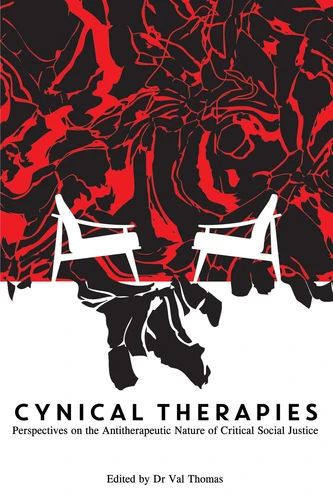Cynical Therapies: Perspectives on the Antitherapeutic Nature of Critical Social Justice
Par :Formats :
Disponible dans votre compte client Decitre ou Furet du Nord dès validation de votre commande. Le format ePub est :
- Compatible avec une lecture sur My Vivlio (smartphone, tablette, ordinateur)
- Compatible avec une lecture sur liseuses Vivlio
- Pour les liseuses autres que Vivlio, vous devez utiliser le logiciel Adobe Digital Edition. Non compatible avec la lecture sur les liseuses Kindle, Remarkable et Sony
 , qui est-ce ?
, qui est-ce ?Notre partenaire de plateforme de lecture numérique où vous retrouverez l'ensemble de vos ebooks gratuitement
Pour en savoir plus sur nos ebooks, consultez notre aide en ligne ici
- FormatePub
- ISBN978-1-922956-56-9
- EAN9781922956569
- Date de parution05/03/2023
- Protection num.pas de protection
- Infos supplémentairesepub
- ÉditeurYahye Siyad
Résumé
Traditional therapy practice is facing a crisis due to the increasing influence of Critical Social Justice (aka 'wokeness'). Activists are reframing the narrative of therapy, seizing control of professional bodies and institutions, and teaching future therapists to view their primary role as changing society. Any critique is cancelled: critics are characterised as reactionary and bigoted. A diverse international group of authors comprising psychotherapists, academics, and psychologists are assembled here to present critical perspectives on the antitherapeutic nature of Critical Social Justice.
The authors consider questions such as: How did therapy become vulnerable to a political authoritarian ideology? How can theories drawn from psychology and psychotherapy shed light on the phenomenon of 'wokeness'? What are the implications of gender ideology for therapeutic practice? How compatible are Critical Social Justice suppositions with established therapy theories and research? What are the implications of the politicisation of professional bodies and training institutes for counselling and psychotherapy? Finally, some thoughts are offered about how to push back against an ideology which threatens to turn the clinical space into a site for the moral re-education of vulnerable clients.
This book represents an ethical call to action: anyone who wishes to preserve the integrity of therapy needs to stand up and make their voices heard.
The authors consider questions such as: How did therapy become vulnerable to a political authoritarian ideology? How can theories drawn from psychology and psychotherapy shed light on the phenomenon of 'wokeness'? What are the implications of gender ideology for therapeutic practice? How compatible are Critical Social Justice suppositions with established therapy theories and research? What are the implications of the politicisation of professional bodies and training institutes for counselling and psychotherapy? Finally, some thoughts are offered about how to push back against an ideology which threatens to turn the clinical space into a site for the moral re-education of vulnerable clients.
This book represents an ethical call to action: anyone who wishes to preserve the integrity of therapy needs to stand up and make their voices heard.
Traditional therapy practice is facing a crisis due to the increasing influence of Critical Social Justice (aka 'wokeness'). Activists are reframing the narrative of therapy, seizing control of professional bodies and institutions, and teaching future therapists to view their primary role as changing society. Any critique is cancelled: critics are characterised as reactionary and bigoted. A diverse international group of authors comprising psychotherapists, academics, and psychologists are assembled here to present critical perspectives on the antitherapeutic nature of Critical Social Justice.
The authors consider questions such as: How did therapy become vulnerable to a political authoritarian ideology? How can theories drawn from psychology and psychotherapy shed light on the phenomenon of 'wokeness'? What are the implications of gender ideology for therapeutic practice? How compatible are Critical Social Justice suppositions with established therapy theories and research? What are the implications of the politicisation of professional bodies and training institutes for counselling and psychotherapy? Finally, some thoughts are offered about how to push back against an ideology which threatens to turn the clinical space into a site for the moral re-education of vulnerable clients.
This book represents an ethical call to action: anyone who wishes to preserve the integrity of therapy needs to stand up and make their voices heard.
The authors consider questions such as: How did therapy become vulnerable to a political authoritarian ideology? How can theories drawn from psychology and psychotherapy shed light on the phenomenon of 'wokeness'? What are the implications of gender ideology for therapeutic practice? How compatible are Critical Social Justice suppositions with established therapy theories and research? What are the implications of the politicisation of professional bodies and training institutes for counselling and psychotherapy? Finally, some thoughts are offered about how to push back against an ideology which threatens to turn the clinical space into a site for the moral re-education of vulnerable clients.
This book represents an ethical call to action: anyone who wishes to preserve the integrity of therapy needs to stand up and make their voices heard.



